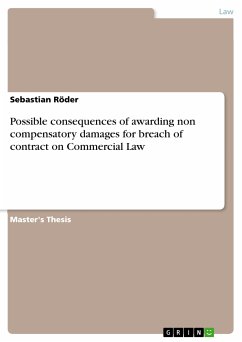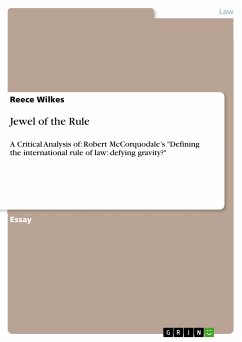Master's Thesis from the year 2010 in the subject Law - Comparative Legal Systems, Comparative Law, grade: B+, University of Auckland, course: Remedies for breach of contract, language: English, abstract: In the now famous Blake case the majority in the House of Lords has granted a (restitutionary) remedy for a breach of contract which has been alien to the law of contract so far. Although it was held to be available only in exceptional circumstances the judgment prompted Lord Hobhouse to express the following warning in his dissenting opinion: "If some more extensive principle of awarding non compensatory damages for breach of contract is to be introduced into our commercial law, the consequences will be very far-reaching and disruptive." It is the goal of this essay to examine whether Lord Hobhouse's fear of a silent reconceptualisation of the law of contract is justified. In order to fully understand the potential impact of the Blake case it is vital to bring oneself to mind what the law of contract was before the judgement in Blake was rendered. Accordingly the essay will start with an outline as to which remedies were and in fact still are available to a claimant under the pre-Blake law. After a summary of the Blake case itself, it will be described why a broad Blake remedy indeed might have a revolutionary effect on the conventional law of contract. However, - as history shows - not all revolutions are bad. Thus, even if Blake should have far-reaching and disruptive consequences on the law of contract it is by no means said that this is an undesirable result. It should be borne in mind that the law of contract is a default system that provides remedies for a breach of contract in case the parties did not - unconsciously or deliberately - stipulate their own remedies which they are free to do. Ideally this default system leads to just and economically reasonable results. By this measure a default system has to prove its value and practicability. Thus, if it turns out that a law of contract under which the Blake remedy is generally available is superior to the current law its implementation must not be declined only because of its revolutionary character. Part IV of this essay draws the necessary comparison between the two alternatives in terms of economic efficiency. In doing so special attention is given to what is called the "efficient breach theory", which is often called upon to defend the current contractual rules. The essay will then conclude with a final assessment as to what the contract of law should be like in the author's opinion.
Dieser Download kann aus rechtlichen Gründen nur mit Rechnungsadresse in A, B, BG, CY, CZ, D, DK, EW, E, FIN, F, GR, HR, H, IRL, I, LT, L, LR, M, NL, PL, P, R, S, SLO, SK ausgeliefert werden.









